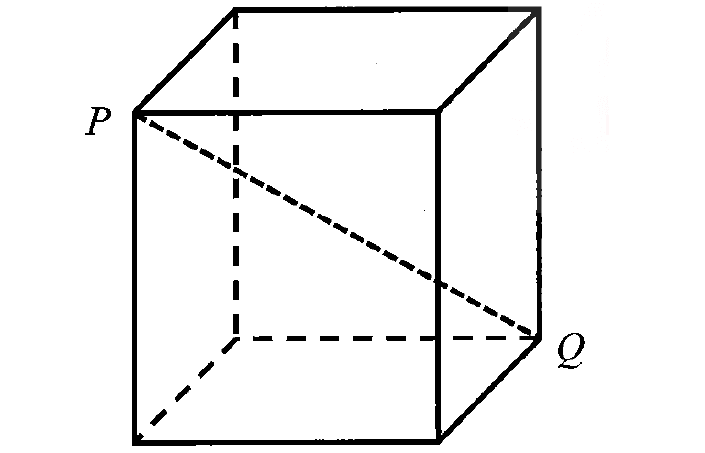FIND QUADRATIC EQUATION WHEN ROOTS ARE GIVEN
If the sum and product of the roots of a quadratic equation is given, we can construct the quadratic equation as shown below.
x2 - (sum of roots) x + product of roots = 0
(or)
x2 - (a+β)x + aβ = 0
Form a quadratic equation whose roots are
(i) 3, 4
(ii) 3+√7, 3-√7
(iii) (4+√7)/2 , (4-√7)/2
Question 1 :
3, 4
Solution :
α = 3, β = 4
x2-(α+β)x+αβ = 0
Sum of roots :
α+β = 3+4 ==> 7
Product of roots :
αβ = 3(4) ==> 12
By applying those values in the general form we get,
x2-7x+12 = 0
Question 2 :
3 + √7 , 3 - √7
Solution :
α = 3+√7, β = 3 - √7
Sum of roots :
α+β = 3+√7+3-√7
= 6
Product of roots :
α β = (3+√7)(3-√7)
= 32 - 7
= 9 - 7
= 2
By applying those values in the general form we get,
x2-6x+2 = 0
Question 3 :
(4+√7)/2 , (4-√7)/2
Solution :
α = (4 + √7)/2, β = (4 - √7)/2
x2-(α+β)x+αβ = 0
Sum of roots :
α + β = (4 + √7)/2 + (4 - √7)/2
= (4 + √7 + 4 - √7)/2
= 8/2
= 4
Product of roots :
α β = [(4 + √7)/2] [(4 - √7)/2]
= (42 - (√7)2)/4
= (16 - 7)/4
= 9/4
by applying those values in the general form we get,
x2-4x+(9/4) = 0
4x2-16x+9 = 0
Question 4 :
If the sum of product of a quadratic equation are -4 and -12 then quadratic equation is.
Solution :
Sum of roots (α + β) = -4
Product of roots (α β) = -12
x2-(-4)x + (-12) = 0
x2+ 4x - 12 = 0
Question 5 :
The roots of the quadratic equation 3x2 - 2√6x + 2 = 0 are ____?
Solution :
3x2 - 2√6x + 2 = 0
3x2 - √6x - √6x + 2 = 0
√3 √3 x2 - √3 √2x - √3 √2x + √2√2 = 0
√3x(√3x - √2) - √2(√3x - √2) = 0
(√3x - √2) (√3x - √2) = 0
Equating each factor to 0, we get
|
√3x - √2 = 0 √3x = √2 x = √2/√3 |
√3x - √2 = 0 √3x = √2 x = √2/√3 |
So, the roots are √2/√3 and √2/√3.
Question 6 :
If -5 is the root of the quadratic equation 2x2 + px - 15 = 0 and the equation P(x2 + x) + k = 0 has equal roots, then find values of p and k.
Solution :
2x2 + px - 15 = 0
Since -5 is one of the roots of the quadratic equation, applying the value of x as -5, we get
2(-5)2 + p(-5) - 15 = 0
2(25) - 5p - 15 = 0
50 - 15 - 5p = 0
-5p + 35 = 0
-5p = -35
Dividing by -5 on both sides, we get
p = 7
By applying the value of p in the equation, we get
2x2 + 7x - 15 = 0
Solving by factoring,
2x2 + 10x - 3x - 15 = 0
2x(x + 5) - 3(x + 5) = 0
(2x - 3) (x + 5) = 0
Equating each factor to 0, we get
x = 3/2 and x = -5
The roots of the equation is
x = 3/2 and x = -5
P(x2 + x) + k = 0
Since this equation has equal roots, then
b2 - 4ac = 0
a = P, b = P and c = k
P2 - 4(P)(k) = 0
P2 - 4Pk = 0
Applying the value of P, we get
72- 4(7)k = 0
49 - 28k = 0
28k = 49
k = 49/28
k = 7/4
So, the value of P is 7 and value of k is 7/4.
Question 7 :
The value of k is ___, if 2 is the root of the following quadratic equation x2 - (k + 1)x + k = 0.
Solution :
x2 - (k + 1)x + k = 0
Since -2 is the root of the equation, applying the value of x as -2, we get
(-2)2 - (k + 1)(-2) + k = 0
4 + 2k - 2 + k = 0
2 + 3k = 0
3k = -2
k = -2/3
So, the value of k is -2/3.
Question 8 :
If 2x2 - (a + 6)2x + 12a = 0, then the roots are
Solution :
2x2 - (a + 6)2x + 12a = 0
2x2 - 2ax - 12x + 12a = 0
Factoring 2x from first two terms, we get
2x(x - a) - 12x + 12a = 0
Factoring 12 from third and fourth term, we get
2x(x - a) - 12(x - a) = 0
(2x - 12) (x - a) = 0
Equation each factor to 0, we get
2x = 12 and x = a
x = 6 and x = a
So, the roots are a and 6.
Kindly mail your feedback to v4formath@gmail.com
We always appreciate your feedback.
©All rights reserved. onlinemath4all.com
Recent Articles
-
Digital SAT Math Problems and Solutions (Part - 151)
Apr 26, 25 11:18 AM
Digital SAT Math Problems and Solutions (Part - 151) -
AP Calculus BC Problems with Solutions
Apr 26, 25 05:49 AM
AP Calculus BC Problems with Solutions -
Digital SAT Math Problems and Solutions (Part - 150)
Apr 25, 25 11:46 AM
Digital SAT Math Problems and Solutions (Part - 150)
